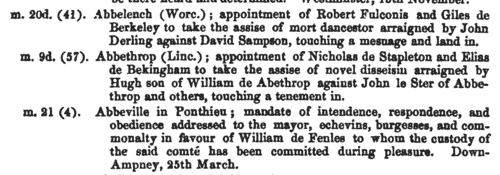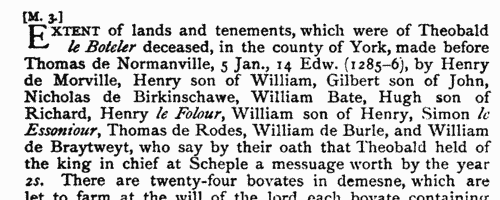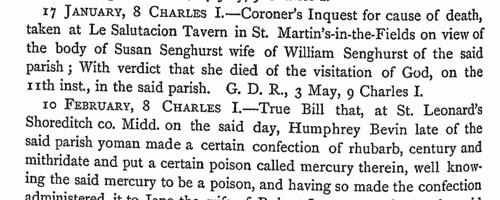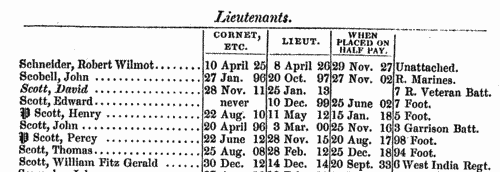Edlington Surname Ancestry ResultsOur indexes 1000-1999 include entries for the spelling 'edlington'. In the period you have requested, we have the following 24 records (displaying 1 to 10): Single Surname Subscription | | | Buying all 24 results of this search individually would cost £132.00. But you can have free access to all 24 records for a year, to view, to save and print, for £100. Save £32.00. More... |
These sample scans are from the original record. You will get scans of the full pages or articles where the surname you searched for has been found. Your web browser may prevent the sample windows from opening; in this case please change your browser settings to allow pop-up windows from this site. Patent Rolls: entries for Lincolnshire
(1278-1279)
Calendars of the patent rolls of the reign of king Edward I are printed in the Calendars of State Papers: but these cover only a fraction of the material on the rolls. From 1881 to 1889 the reports of the Deputy Keeper of the Public Record Office also include calendars of other material from the rolls - about five times as many entries as in the State Papers - predominantly mandates to the royal justices to hold sessions of oyer and terminer to resolve cases arising locally; but also other general business. The calendar for the 7th year of king Edward I [20 November 1278 to 19 November 1279], hitherto unindexed, is covered here.EDLINGTON. Cost: £6.00.  | Sample scan, click to enlarge

| Yorkshire Inquisitions
(1275-1295)
Inquisitions post mortem are inquiries as to the real estate and heir of each person holding in capite or in chief, i. e. directly, from the Crown, or whose estates had been escheated or were in ward. The age and relationship of the heir are usually recorded. Inquisitions ad quod damnum enquired as to any activities (including maladministration by local officials) that had resulted in any material loss to the Crown. Proofs of age are inquiries into the precise date of birth of an heir, usually involving local inhabitants recalling those circumstances which fixed that date in their mind. Yorkshire inquisitions for this period were edited by William Brown for the Yorkshire Archaeological Society, and printed in 1898. This index covers all names mentioned, including jurors, tenants, &c. EDLINGTON. Cost: £4.00.  | Sample scan, click to enlarge

| Close Rolls
(1302-1307)
The close rolls of the 31st to 35th years of the reign of king Edward I, that is to the day of his death (7 July 1307), record the main artery of government administration in England, the orders sent out day by day to individual officers, especially sheriffs of shires: they are an exceptionally rich source for so early a period. In amongst this official material, the rolls were also used as a way of recording many acknowledgments of private debts and contracts between individuals. Most of the contents relate to England, but there are also entries concerning Wales, Scotland, Ireland and the English possessions in France.EDLINGTON. Cost: £4.00.  | Sample scan, click to enlarge

| Retired monks, nuns and chantry priests in the east Midlands
(1547-1551)
Lists of pensions being paid to monks, nuns and chantry priests in the diocese of Lincoln after the dissolution of the monasteries and chantries. The diocese covered Bedfordshire, Buckinghamshire, part of Hertfordshire, Huntingdonshire, Leicestershire and Lincolnshire. Oxfordshire, Northamptonshire and Rutland, which had been shorn from the diocese, are not covered by these returns.
EDLINGTON. Cost: £6.00.  | Sample scan, click to enlarge

| Middlesex Sessions
(1625-1666)
Incidents from the Middlesex Sessions Books. These are abstracts of sessional orders, minutes of criminal cases, memoranda and other entries of record taken from the volumes of Gaol Delivery Register, Books and Rolls, Sessions of Peace Register, and Process Books of Indictments for the county of Middlesex from the death of king James I to the Great Fire of London. The references at the end of each item indicate the volume in question, the abbreviations being G. D. for Gaol Delivery, S. P. for Sessions of Peace, and S. O. T. for Session of Oyer and Terminer; occasionally preceded by S. for Special or G. for general, or followed by R. for Roll or Reg. for Register. It should be noted that, in the case of 'true bills' or indictments, the abstract starts with the date on which the offence took place, the date of the conviction &c. being at the end of the entry. These abstracts, prepared by John Cordy Jeaffreson for the Middlesex County Record Society, are far from being a complete calendar of these extensive records; his purpose was, in part, to notice 'every parchment that should exhibit a famous person's name or any other feature of personal interest'.EDLINGTON. Cost: £4.00.  | Sample scan, click to enlarge

| Nottinghamshire Marriage Licences
(1577-1700)
Nottingham Archdeaconry, which was almost coextensive with the county of Nottingham, lay in the diocese and province of York, but it had substantially independent jurisdiction for both probate and the issuing of marriage licences. These are abstracts of the archdeaconry marriage licences: they usually state the groom's address, occupation, age, and condition; the bride's address, age and condition; and the names of the churches or parishes at which it was intended the marriage would be celebrated. Not all licences led to marriages. Where the age given is 21, it should be construed as '21 or over'. There was no obligation for the marriage to take place at the parish suggested, but the licence would only be valid within the county. These abstracts have been annotated with extra information found on the marriage bonds. 26 Nottinghamshire parishes (Beckingham, Darlton, Dunham, Eaton, North Leverton, Ragnall, Rampton, South Wheatley, Cropwell Bishop, Bleasby, Blidworth, Calverton, Caunton, Edingley, Farnsfield, Halloughton, Holme, Kirklington, Morton, North Muskham, Norwell, Oxton, South Muskham, Southwell, Upton and Woodborough) lay within the small peculiar jurisdiction of Southwell, which issued its own licences: abstracts of these for the period 1588 to 1754 are also included here.EDLINGTON. Cost: £4.00.  | Sample scan, click to enlarge

|  Apprentices registered at York
(1741-1745) Apprentices registered at York
(1741-1745)
Apprenticeship indentures and clerks' articles were subject to a 6d or 12d per pound stamp duty: the registers of the payments usually give the master's trade, address, and occupation, and the apprentice's father's name and address, as well as details of the date and length of the apprenticeship. There are central registers for collections of the stamp duty in London, as well as returns from collectors in the provinces. These collectors generally received duty just from their own county, but sometimes from further afield. (The sample entry shown on this scan is taken from a Norfolk return)EDLINGTON. Cost: £8.00.  | Sample scan, click to enlarge

| Nottinghamshire Marriage Licences
(1701-1753)
Nottingham Archdeaconry, which was almost coextensive with the county of Nottingham, lay in the diocese and province of York, but it had substantially independent jurisdiction for both probate and the issuing of marriage licences. These are abstracts of the archdeaconry marriage licences: they usually state the groom's address, occupation, age, and condition; the bride's address, age and condition; and the names of the churches or parishes at which it was intended the marriage would be celebrated. Not all licences led to marriages. Where the age given is 21, it should be construed as '21 or over'. There was no obligation for the marriage to take place at the parish suggested, but the licence would only be valid within the county. These abstracts have been annotated with extra information found on the marriage bonds. 26 Nottinghamshire parishes (Beckingham, Darlton, Dunham, Eaton, North Leverton, Ragnall, Rampton, South Wheatley, Cropwell Bishop, Bleasby, Blidworth, Calverton, Caunton, Edingley, Farnsfield, Halloughton, Holme, Kirklington, Morton, North Muskham, Norwell, Oxton, South Muskham, Southwell, Upton and Woodborough) lay within the small peculiar jurisdiction of Southwell, which issued its own licences: abstracts of these for the period 1755 to 1833 are also included here.EDLINGTON. Cost: £4.00.  | Sample scan, click to enlarge

| Officers of the British Army on Foreign Half-Pay
(1840)
The New Annual Army List, corrected to 7 February 1840, was published in London by Lieut. H. G. Hart. The section entitled 'Officers on the Retired Full Pay and Half Pay' lists all such officers, by rank from captain down to ensign, with paymasters, adjutants, quarter-masters, medical staff and chaplains. (Officers above the rank of captain were retained in the main list of Field Officers). These lists are annotated with dates of successive ranks, when placed on half-pay, and the name of the regiment, &c., and with symbols indicating the officers present at Trafalgar (T), in the Peninsula or the South of France (P), and Waterloo (W). Names of officers on retired full-pay are given in italics. The list covers not only the regiments of the line, but also the Royal Artillery, Royal Engineers, Royal Marines, Staff, and Military Departments.EDLINGTON. Cost: £4.00.  | Sample scan, click to enlarge

|  Persons of standing recommending London police recruits
(1830-1842) Persons of standing recommending London police recruits
(1830-1842)
The Metropolitan Police Register of Joiners (MEPO 333/4) lists policemen joining the force through to 31 December 1842 (to warrant number 19892). The register is alphabetical, in so far as the recruits are listed chronologically grouped under first letter of surname. It is evidently a continuation of a similar earlier register, not closed until its alphabetical sections were filled: consequently, there are no entries in this register for the initial letters N, O, Q, U, V, X, Y or Z; and the sections of this register start at different dates - A 18 April 1840 (warrant number 16894); B 11 December 1830 (5570); C 7 September 1830 (4988); D 27 May 1833 (8445); E 15 December 1838 (14476); F 30 March 1832 (7372); G 1 December 1835 (11,184); H 25 April 1832 (7457); I and J 13 February 1837 (12449); K 2 January 1838 (13457); L 3 October 1834 (9905); M 15 November 1832 (7999); P 4 October 1831 (6869); R 4 September 1837 (13021); S 30 March 1835 (10366); T 6 April 1840 (16829); W 30 December 1833 (9096). The register gives Date of Appointment, Name, Number of Warrant, Cause of Removal from Force (resigned, dismissed, promoted or died), and Date of Removal. Those recruits not formerly in the police, the army, or some government department, were required to provide (normally) at least two letters of recommendation from persons of standing, and details of these are entered on the facing pages: the names in these are indexed here (the police recruits are indexed separately and not included here). Recruits transferred from other forces or rejoining the force did not normally need recommendations - in the latter case, former warrant numbers are given - but some recommendations are from police inspectors, even other constables. Recruits coming from the army sometimes have general military certificates of good conduct, but most often have a letter from their former commanding officer; recruits recommended by government departments (most often the Home Office) similarly have letters from the head of department. But the great majority of the names and addresses in these pages are of respectable citizens having some sort of personal acquaintance with the recruit. Where more than two recommendations were provided, the clerk would only record one or two, with the words 'and others'. Tradesmen are sometimes identified as such by their occupations; there are some gentry. Although the great bulk of these names are from London and the home counties, a scattering are from further afield throughout Britain and Ireland. EDLINGTON. Cost: £8.00.  | Sample scan, click to enlarge

|
Research your ancestry, family history, genealogy and one-name study by direct access to original records and archives indexed by surname.
|













